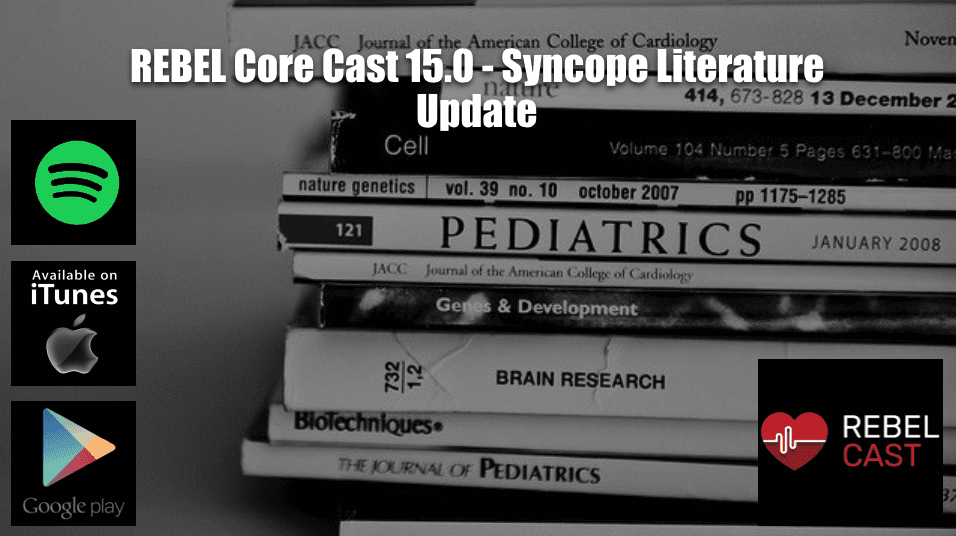
 Take Home Points
Take Home Points
-
There is no real distinction between syncope and near syncope.
-
Older folk with near syncope or syncope should be treated the same.
-
Patient with high risk features its reasonable to admit but if they’re low risk, well-appearing and have reasonable follow up discharge home is fine.
REBEL Core Cast 15.0 – Syncope Literature Update
Syncope defined as transient loss of consciousness with spontaneous and complete recovery to pre event status.
Near-Syncope is a more nebulous definition, essentially feeling like you’re going to have a syncope but not having it.
Many providers consider these two entities to lie along a spectrum of disease with near syncope considered to be the less dangerous of the two. The literature on this is inconsistent. A study in 2009 considered near syncope to be a low risk factor and a study in 2015 found that near syncope was more concerning.
So with this conflicting data what does Near-Syncope mean to us in the emergency department?
Bastani A et al. Comparison of 30-Day Serious Adverse Clinical Events for Elderly Patients Presenting to the Emergency Department with Near-Syncope Versus Syncope. Ann Emerg Med 2018. PMID: 30529112
Clinical Question : What is the incidence of death or serious clinical events during the 30 days following an ED presentation for syncope or near-syncope in patients > 60?
Findings: Study enrolled 3600 patients and they found that the rate of death or a serious outcome at 30 days was not statistically significantly different between patients with syncope or near syncope at about 18%. Authors used multivariate logistical regression and still could not find a difference.
Study Weakness : It is not a randomized control trial, study is prospective observational.
Authors Conclusion : Near-syncope confers risk to patients similar to that of syncope for the composite outcome of 30-day death or serious clinical event
Our Conclusion : Very similar to the authors, in older adults (>60 years of age) near syncope and syncope appear to have equal risk of death or serious clinical event at 30 days. When seeing this presentation in the ED, consider these two entities as the same.
Probst MA et al. Clinical Benefit of Hospitalization for Older Adults with Unexplained Syncope: A Propensity-Matched Analysis. Ann Emerg Med 2019. PMID: 31080027
Clinical Question : Does hospital admission of ED patients >60 years of age with syncope reduce the rate of serious adverse outcomes?
Findings : Of note the cohort of patients used in this study is the same as the previous study, the numbers are identical. The study found no statistically significant difference between patients that were admitted to the hospital and thus discharged home. They also found no significant difference in mortality and lethal dysrhythmias.
Study Weakness : Not a randomized control trial and study is prospective observational. We don’t know why clinicians either discharged or admitted a patient, so impossible to tell confounders. There is no data on what diagnostic studies or interventions were performed on patients after admission or after discharge.
Authors Conclusion : In our propensity-matched sample of older adults with unexplained syncope, for those with clinical characteristics similar to that of the discharged cohort, hospitalization was not associated with improvement in 30-day serious adverse event rates.
Our Conclusion : In this propensity-matched sample of prospectively enrolled patients > 60 years of age with syncope or near-syncope, hospitalization was not associated with a decrease in serious adverse events.
So what do we do about these two studies?
With an 18% serious outcome event in syncope and near syncope at 30 days we should definitely admit these patients to the hospital…..right? There’s no clear evidence that admitting the patient to the hospital would benefit the patient. There’s evidence that admission changes nothing and similar results have been found in previous studies. If you don’t find the cause in the ED, it’s unlikely one will be found during the admission.
For More on Topic Checkout:
- REBEL EM: 30-Day Outcomes in Syncope vs Near-Syncope
- REBEL EM: Is There a Benefit to Hospitalization in Syncope?
- REBEL EM: Duration of Electrocardiographic Monitoring of Emergency Department Patients with Syncope
Shownotes Written By: Miguel Reyes, MD (Twitter: @miguel_reyesMD)
Post Peer Reviewed By: Salim R. Rezaie, MD (Twitter: @srrezaie)
The post REBEL Core Cast 15.0 – Syncope Literature Updates appeared first on REBEL EM - Emergency Medicine Blog.
